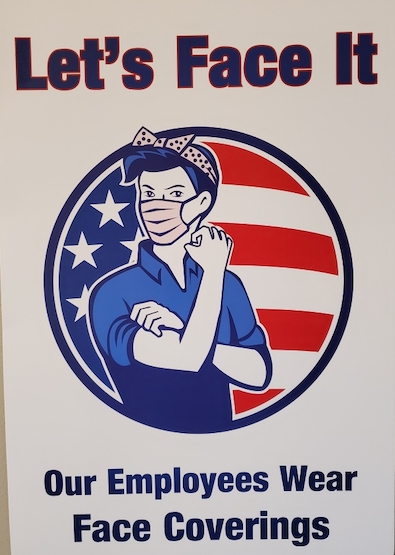* I asked IDPH Director Ngozi Ezike about this paper yesterday, but she hadn’t yet seen it. That’s understandable. She’s super-busy. But it might hold at least one possible key for institutions that house large numbers of people, like nursing homes…
Prof. Akiko Iwasaki, an immunobiologist at Yale University, in New Haven, CT, is the senior author of the paper, which appears in the Annual Review of Virology.
As Prof. Iwasaki and the co-authors note, seasonal cycles are known to play a crucial role in the transmission of respiratory viral illnesses. […]
First, they say that when cold, dry air comes indoors and is warmed, the relative humidity indoors drops by about 20%. Such a drop in humidity makes it easier for airborne viral particles to travel.
Second, the hair-like organelles outside of cells that line the body’s airways, called cilia, do not function as well in dry conditions — they cannot expel viral particles as well as they otherwise would.
For instance, the new review cites one study that found that mice in an environment with 10% relative humidity had impaired clearance of the influenza virus, compared with mice in an environment with 50% relative humidity.
Furthermore, studies have shown that “Dry air exposure of mice impairs epithelial cell repair in the lung after influenza virus infection,” according to the new analysis.
Lastly, the authors point out, several studies in mice have shown that the immune response to viruses is less efficient in drier conditions.
The full paper is here. Worth a read.
They also recommend an indoor environment of 40-60 percent humidity…
“That’s why I recommend humidifiers during the winter in buildings,” says the study’s senior author.
Humidity today in Chicago is 39 percent. The paper also cites a study about the benefits of ventilation, so maybe open some windows. Couldn’t hurt.
* The paper also points to studies which encourage wearing face masks to keep your nose warm and moist. Turns out, masks could be more helpful than many of us knew.
And speaking of face masks, here’s Rep. Mark Batinick, an advocate for a state mask-wearing requirement…
Coming Monday our office will be starting our next program: “Let’s Face It”. We are going keep a list of Restaurants and Stores in the 97th that commit to having their employees wear face coverings at work. Our first establishment is “Hopscotch and Vine”. The first 20 who commit will get 50 free masks from me. We are going to get posters printed but that may take a bit of time. In the meantime establishments can advertise this additional bit of safety on their own. I’m asking all restaurants and stores to please require your employees to wear a face covering. It does not have to be a mask. Any face covering will do. Let’s end this thing and get to work again!
He’s giving away this cool poster to display at establishments which have agreed to comply…

Last week, Batinick and his staff delivered 2000 surgical masks to nursing homes and senior assisted living communities.
* OK, back to nursing homes. Here’s NBC 5..
New data from the Illinois Department of Public Health shows how widespread the coronavirus has become in the state’s nursing homes, with at least 272 deaths and nearly 3,300 cases of the virus reported by officials.
The data, gleaned from 17 of Illinois’ 102 counties, shows that 133 facilities have reported five or more cases of the coronavirus since the pandemic began. In those counties, a total of 272 deaths have been reported as a result of COVID-19, and 3,265 cases of the virus have been confirmed by laboratory testing. […]
The top five counties in terms of cases reported:
1. Cook County - 1,496 cases confirmed, 141 deaths
2. DuPage County - 470 cases confirmed, 37 deaths
3. Will County - 421 cases confirmed, 36 deaths
4. Lake County - 283 cases confirmed, 31 deaths
5. Kane County - 119 cases confirmed, 10 deaths
Unfortunately, there was some sort of glitch and the new page wasn’t available this morning. The page is back up. Click here.
* A quick Nursing home roundup…
* In Cook County, Nursing Homes Account For A Quarter Of COVID-19 Deaths
* 23 coronavirus deaths at Illinois nursing home prompts Joliet mayor to call for probe
* 25 coronavirus-related deaths reported at Symphony of Joliet nursing home
* 4 die from virus at Lincoln Park nursing home
* National Guard dispatched to Park Forest home for developmentally disabled with 110 cases
* Back to masks…
If you do venture out despite Illinois’ stay-at-home order – to go to work, to buy groceries, maybe to talk a walk – you generally won’t get in trouble for not wearing a mask, though it’s encouraged.
But in some pockets of Illinois, it’s mandatory.
Municipalities including Cicero, Glenview, Highland Park, Morton Grove, Niles, Skokie and Wilmette require anyone to wear a mask while in public.
There are slight variations in these ordinances and executive orders; some are already in effect, while others will take effect Monday.
But by and large, masks that cover the nose and mouth are obligatory for anyone working at or patronizing essential businesses, like grocery stories, and while taking public transit or ride-hailing services and taxis.



















